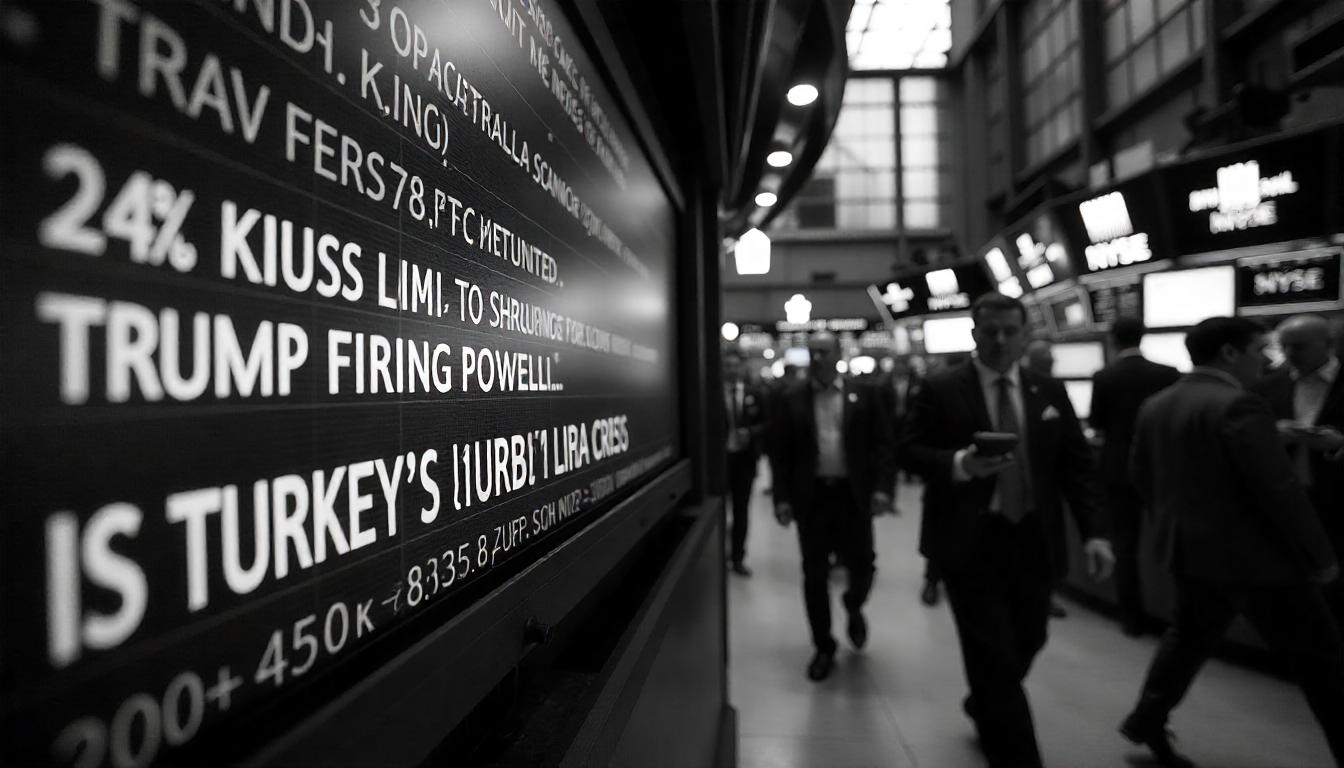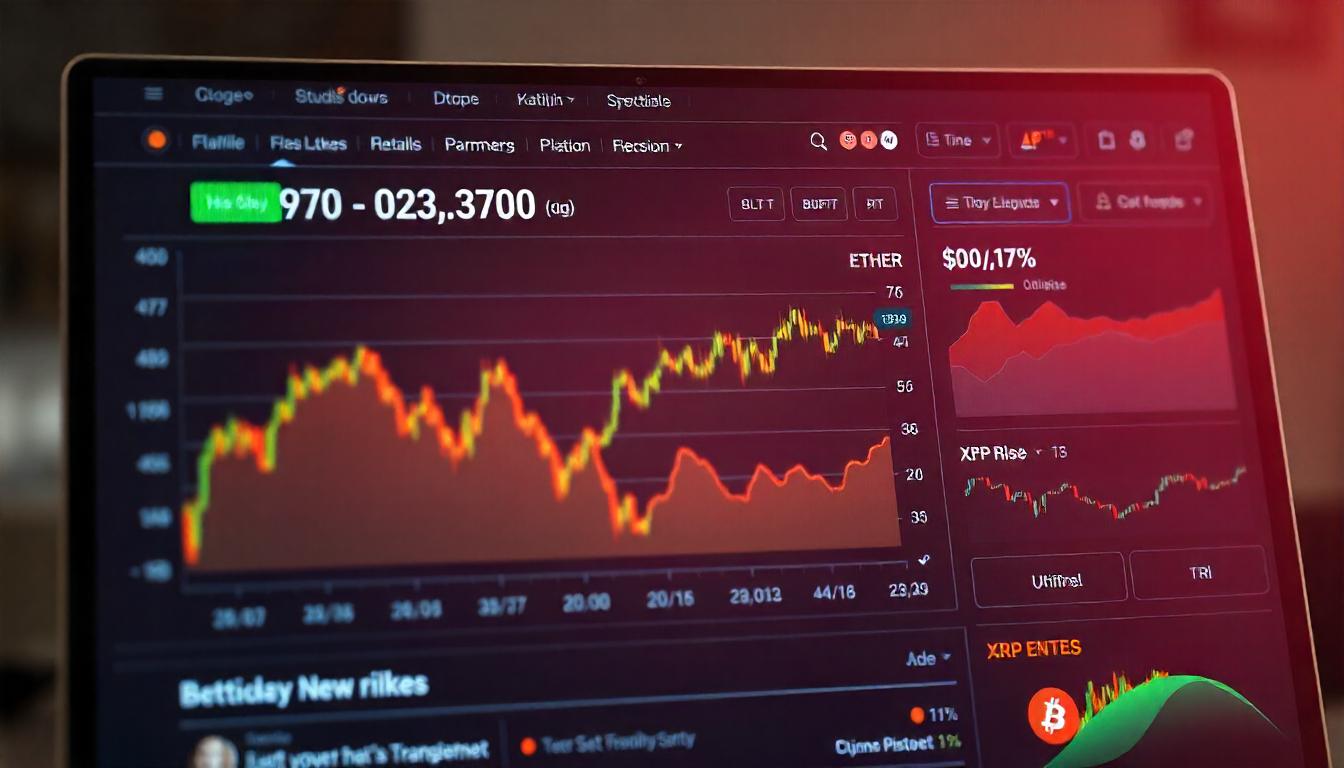Bitcoin’s Resilience Amid Economic Instability: Can Trump’s Conflict with the Fed Spark a Shift Toward Digital Assets?
Bitcoin (BTC) is defying broader market trends, holding steady at $87,000, despite the U.S. dollar’s decline to three-year lows and Wall Street experiencing significant losses. This resilience could signal a shift in Bitcoin’s role as an alternative, safe-haven asset, particularly as U.S. President Donald Trump continues to challenge the Federal Reserve’s leadership and policies.
While traditional markets suffer, Bitcoin’s price has increased by 2% in the last 24 hours, suggesting a growing confidence in the cryptocurrency amid global economic uncertainties. As Trump’s public feud with Federal Reserve Chairman Jerome Powell intensifies, the DXY index and U.S. stock markets have taken a hit, which might set the stage for Bitcoin’s evolution as a financial safe haven.
A Lesson from Turkey’s Currency Crisis: Could Bitcoin Be a Hedge for Dollar Weakness?
The ongoing situation in Turkey serves as a valuable lesson for what could happen to the U.S. dollar if Trump’s attempts to weaken the Fed’s independence succeed. Turkey’s central bank interference under President Recep Tayyip Erdogan has led to the collapse of the Turkish lira (TRY), with many Turks turning to Bitcoin and stablecoins as a safer alternative.
Since Erdogan’s interference with Turkey’s central bank policy began in 2019, the lira has dropped precipitously, and inflation has soared, creating a financial climate where traditional savings methods no longer provide security. Citizens have increasingly sought refuge in digital currencies like Bitcoin, which is resistant to government interference and provides protection against inflationary pressures.
As Trump intensifies his criticisms of the Federal Reserve, many are beginning to wonder if the U.S. might see a similar scenario unfold, leading to a devaluation of the U.S. dollar and an increased reliance on decentralized assets like Bitcoin.
Trump vs. Powell: The Risk of Undermining the Federal Reserve’s Independence
Trump’s long-standing frustration with the Federal Reserve and Jerome Powell’s policies have reached new heights. The President has repeatedly called for lower interest rates, even as Powell warns of potential inflation risks. Recent reports suggest Trump may be trying to find a way to remove Powell, further complicating the relationship between the White House and the Fed.
Trump’s pressure on Powell and calls for an immediate rate cut are in stark contrast to the Fed Chairman’s cautious approach, which aims to address inflation without triggering an economic slowdown. The uncertainty surrounding the Fed’s leadership is contributing to broader concerns about the stability of U.S. monetary policy, making the dollar more vulnerable to devaluation.
The Turkish Lira Crisis: A Cautionary Tale for the Dollar
In 2019, Erdogan’s decision to force out the Central Bank of Turkey’s leadership and pursue policies of low interest rates despite high inflation led to the collapse of the lira. In response to the lira’s sharp decline, Turkish citizens and investors flocked to Bitcoin and stablecoins as a way to protect their savings from currency devaluation.
As of 2025, Turkey faces an inflation rate near 40%, and the lira has lost nearly 90% of its value against the dollar since 2019. The lesson from Turkey is clear: when a government undermines its central bank’s ability to act independently, it risks losing investor confidence, which can lead to the collapse of the national currency.
While the U.S. dollar is not in immediate danger of a collapse like the lira, a similar erosion of trust in U.S. monetary policy could lead to significant devaluation. The DXY index has already fallen 10% in three months, indicating growing unease about the dollar’s future stability.
What Could Happen if Trump Succeeds in Weakening the Fed?
If Trump successfully diminishes the Federal Reserve’s independence, it could trigger a broad shift in global financial markets. The U.S. dollar, as the world’s reserve currency, holds significant sway over international trade and investments. A loss of confidence in the dollar could prompt global investors to seek alternatives, such as Bitcoin, to safeguard their capital.
In countries with trade surpluses and large foreign investments, like China and Japan, a weakened dollar could lead to a reconsideration of U.S. assets, particularly U.S. Treasury bonds. This could spark volatility in both the U.S. stock market and the global financial system, further driving interest in decentralized assets like Bitcoin.
Bitcoin’s Role as a Safe-Haven Asset in Times of Economic Stress
As the U.S. dollar weakens and investor confidence wavers, Bitcoin may emerge as a preferred store of value, much like gold. In times of political and economic uncertainty, Bitcoin’s decentralized nature makes it an attractive option for those looking to hedge against the risks associated with fiat currencies and centralized financial systems.
Just as Turks turned to Bitcoin in response to the collapse of their national currency, U.S. investors may begin to shift their assets away from dollar-denominated holdings into Bitcoin if confidence in the dollar continues to erode. The rise of Bitcoin as a safe-haven asset could accelerate if the U.S. faces further instability due to political interference with its central bank.
A New Era for Bitcoin?
The growing instability in both the U.S. dollar and global financial markets may mark the beginning of a new era for Bitcoin as a store of value. If Trump’s conflict with the Federal Reserve continues, and the U.S. dollar suffers from devaluation, Bitcoin’s role as a hedge against inflation and economic uncertainty could become increasingly important.
With Bitcoin’s resilience in the face of broader market downturns, it is possible that the cryptocurrency will continue to evolve as a safe-haven asset, offering protection against both currency devaluation and political interference in monetary policy. As the world watches how the U.S. and other major economies navigate these challenges, Bitcoin may increasingly be seen as an alternative to traditional financial systems.





